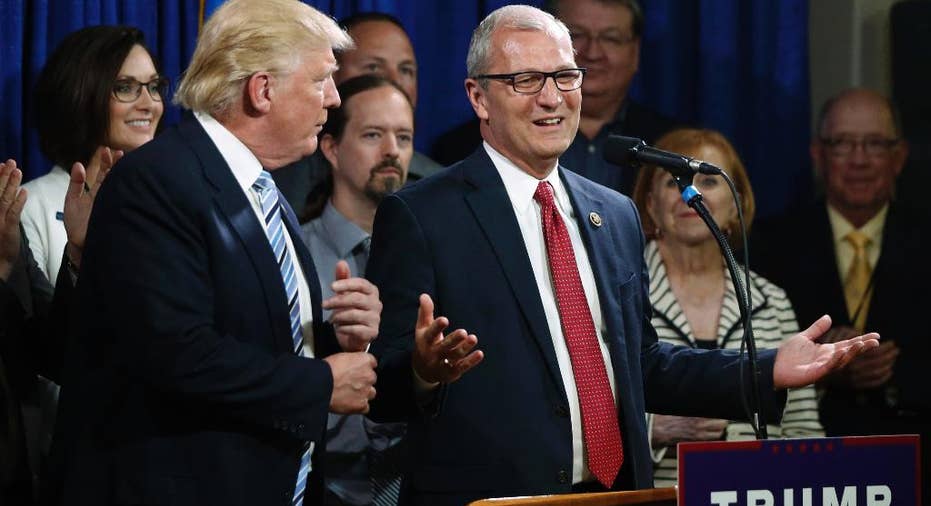North Dakota Senate hopeful woos oil and gas moguls

Rep. Kevin Cramer of North Dakota was one of the first to endorse Donald Trump's presidential bid. AP
Republican Rep. Kevin Cramer of North Dakota, trailing Democratic Sen. Heidi Heitkamp in fundraising as he tries to wrest away her Senate seat, is courting some of the state’s most powerful oil and gas tycoons for financial support, FOX Business has learned.
The Cramer campaign is organizing fundraising events across the country, including two on March 27 in Dallas and Houston, according to sources with direct knowledge of the matter. Before the campaign heads to the Lone Star State, Vice President Mike Pence was invited for an event in Fargo, North Dakota, at the Delta hotel on March 26, the sources said. The expected price will likely start at about $1,000 per person.
Other fundraisers tentatively planned include one sponsored by the National Republican Senatorial Committee (NRSC), the fundraising arm of the Senate’s Republican wing, on March 12 in New York City and a campaign backed event in Phoenix on March 25 at the luxurious Phoenician Hotel.
Most of the invitations will go to oil and gas business people, a group responsible for almost 9 percent of the state’s workforce.
A spokeswoman for the NRSC did not return requests for comment. A spokesman for Pence also did not return repeated requests for comment at the time of publication.
The main objective for Cramer’s team is to corral industry leaders from a variety of states. One of those is Kelcy Warren, the CEO of Energy Transfer Partners, according to people close to the congressman. The Dallas company claims to have one of the most diversified portfolios of energy assets in the U.S., with a total of more than 71,000 miles of gas and oil pipelines throughout 38 states.
Warren has been a friend of Cramer for years and hosted at least two fundraisers for him when he ran for re-election to the House of Representatives. Executives of Energy Transfer Equity, the sister corporation of Energy Transfer Partners, have contributed $31,000 to Cramer’s campaign so far, according to data from the Center for Responsive Politics.
Another titan of the billion-dollar oil and gas industry that the Cramer campaign is looking to reel in John Hess, the CEO of the gas behemoth Hess Corp., according to people close to the campaign. Hess is a leading shale oil and gas producer, with one of the largest deepwater operations in the Gulf of Mexico. For Hess Corp., North Dakota is an example of its success in bolstering employment, with its website claiming to have created more than 4,000 jobs statewide.
John Hess has been a major supporter of Republican candidates, with the oil executive contributing $148,000 to GOP causes in the early stages of the 2018 election cycle. In 2016, he contributed more than $300,000, with $33,000 of that total going toward the NRSC.
A spokesman for Hess did not return requests for comment. A spokesperson for Energy Transfer Partners also did not return calls for comment. A spokesman for the Cramer campaign declined to comment.
The campaign believes the efforts Cramer made as a congressman to deregulate the oil and gas industry will help him in enlisting these moguls. Cramer was chosen as President Donald Trump’s energy policy adviser during the 2016 election. Advisers to Trump, then a Republican nominee for president, asked Cramer to write a report detailing potential energy policy ideas. The report warned of foreign ownership of U.S. energy assets and called for the removal of the burdensome taxes and regulations on the energy industry.
Cramer has sponsored legislation designed to help the oil and gas business. For instance, a piece of 2015 legislation known as the Natural Gas Gathering Enhancement Act would have allowed the Interior Department to “permit the use of rights of way for natural gas pipelines through public lands, forest and other reservations,” including a unit of the National Park System. The bill was never called for a vote.
Sen. Heitkamp has a mixed history of backing the energy business. In 2012, she voted against the repeal of President Barack Obama’s regulation that targeted the oil and gas industry’s efforts to carry out production on federal lands. Yet she helped pass the bipartisan Senate Energy Bill in 2016 that gave the coal industry a boost in technology and sped up the approval process for exporting liquefied natural gas. At the time, she claimed in a statement that the bill would create jobs while modernizing the energy grid.



















